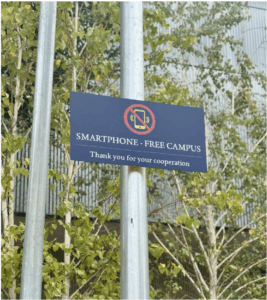Dear Parents,
As we approach the Christmas season, I am writing with a renewed and urgent appeal regarding the use of smartphones among our younger pupils. At this time of year, the pressure grows on families to purchase such devices as gifts. I ask you to resist that pressure and to join the Parent Pact if you have not already done so — a shared commitment not to buy your child a smartphone before the age of 16.
Last year, support for this initiative was disappointingly low, with only 51% of parents of pupils in Pre-Nursery to Year 11 joining the Pact (75% Pre-Prep, 55% Prep, 11% Senior). I was genuinely saddened by the response, particularly given the overwhelming evidence of the harm early smartphone use inflicts on children.
Smartphones interrupt the sustained focus and quiet thought that intellectual growth depends on. As Jonathan Haidt warns in The Anxious Generation (2024), “the smartphone rewired childhood,” replacing exploration and curiosity with “a dopamine-driven feedback loop of scrolling, posting, and comparison.” Instead of reading, thinking, or imagining, children are conditioned to crave constant stimulation.
Every major study reaches the same conclusion: pupils who use smartphones heavily perform worse in school. Notifications, social media, and late-night screen use erode attention, sleep, and memory. A phone on the desk or in the pocket is an open invitation to distraction—academic effort simply cannot compete.
The rise in adolescent anxiety, depression, and loneliness coincides precisely with the spread of smartphones. Constant exposure to social media creates a relentless cycle of comparison and insecurity.
Beyond distraction and mental-health concerns, the online world exposes children to dangers no young person can face alone. Increasingly, pupils are being targeted through “sextortion”—criminal blackmail involving the coercion or faking of compromising images, often by strangers posing as peers. The spread of AI tools that can create false sexualised images from innocent photos makes this threat even more alarming. Whether real or fabricated, the damage to a child’s confidence, reputation, and safety can be profound.
A smartphone gives a child unsupervised access to the adult world—and gives that world direct access back to them. The surest safeguard is simply to delay access until they are ready to manage it.
These are not abstract concerns. At Runnymede we are seeing a sharp increase in online bullying—cases that would not exist without smartphones. At the start of term, I warned all Senior School pupils about the consequences. Sadly, several have now been suspended, and at this rate expulsions will follow in all probability.
The school will continue to act firmly, but real change depends on parents. By signing the Parent Pact, you take a clear, collective stand to protect childhood from premature exposure to the digital world.
I would also like to draw your attention to the fact that, as is clear from the new signs, our campus is now a smartphone-free space. Parents are requested not to use their devices on school grounds, and to ensure that cuidadoras and others collecting or delivering children also comply with this rule. This measure is not merely symbolic: it reinforces the example we wish to set for our pupils and the atmosphere of calm and attentiveness we wish to preserve at Runnymede.
You may wish to watch this short video, which powerfully illustrates the impact of early smartphone use on children and the importance of delaying access.
I urge you to join this initiative today if you have not already done so. Together we can safeguard our children’s minds, learning, and wellbeing—values far more precious than any device.
Click here to sign the Parent Pact.


